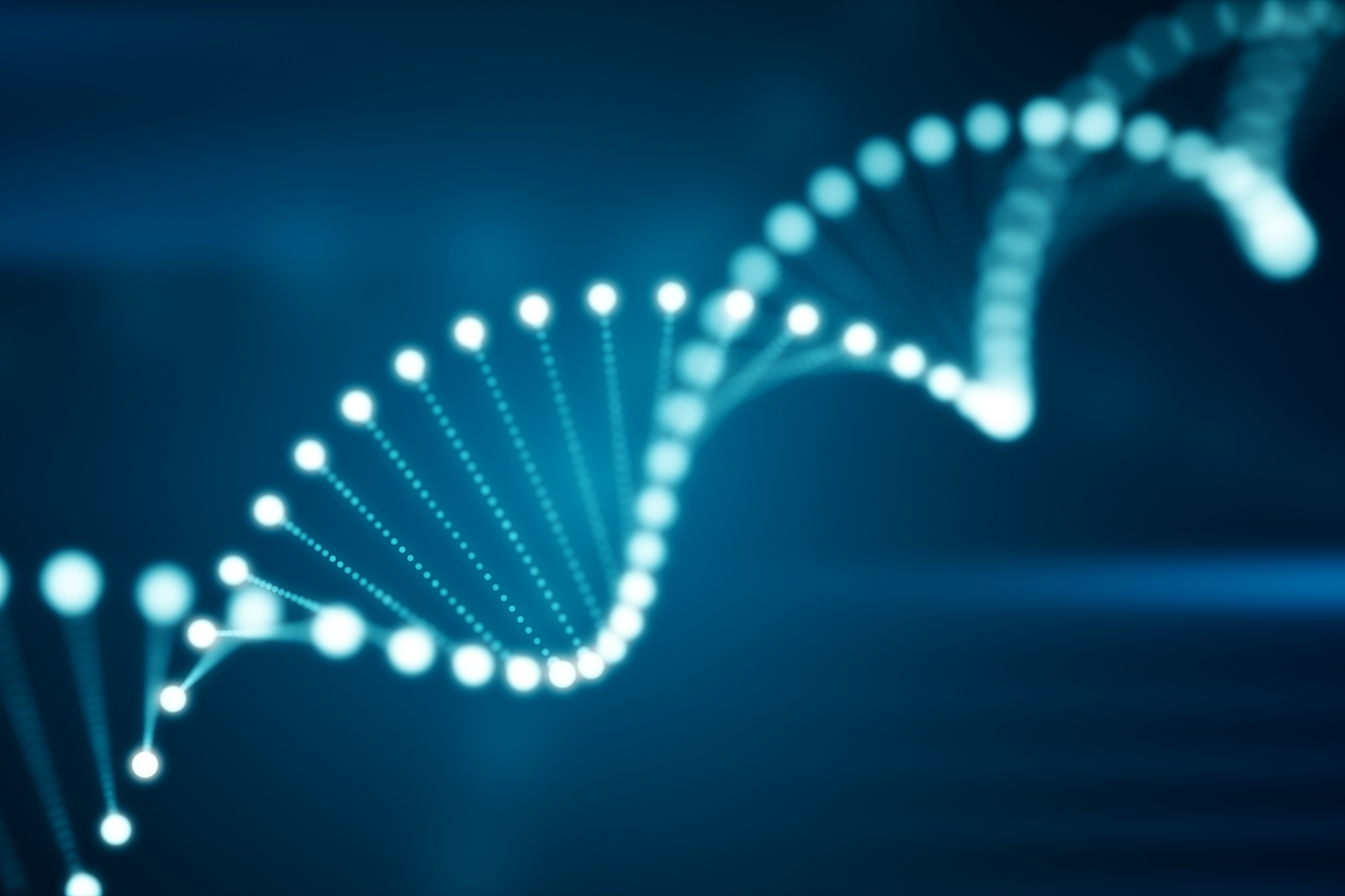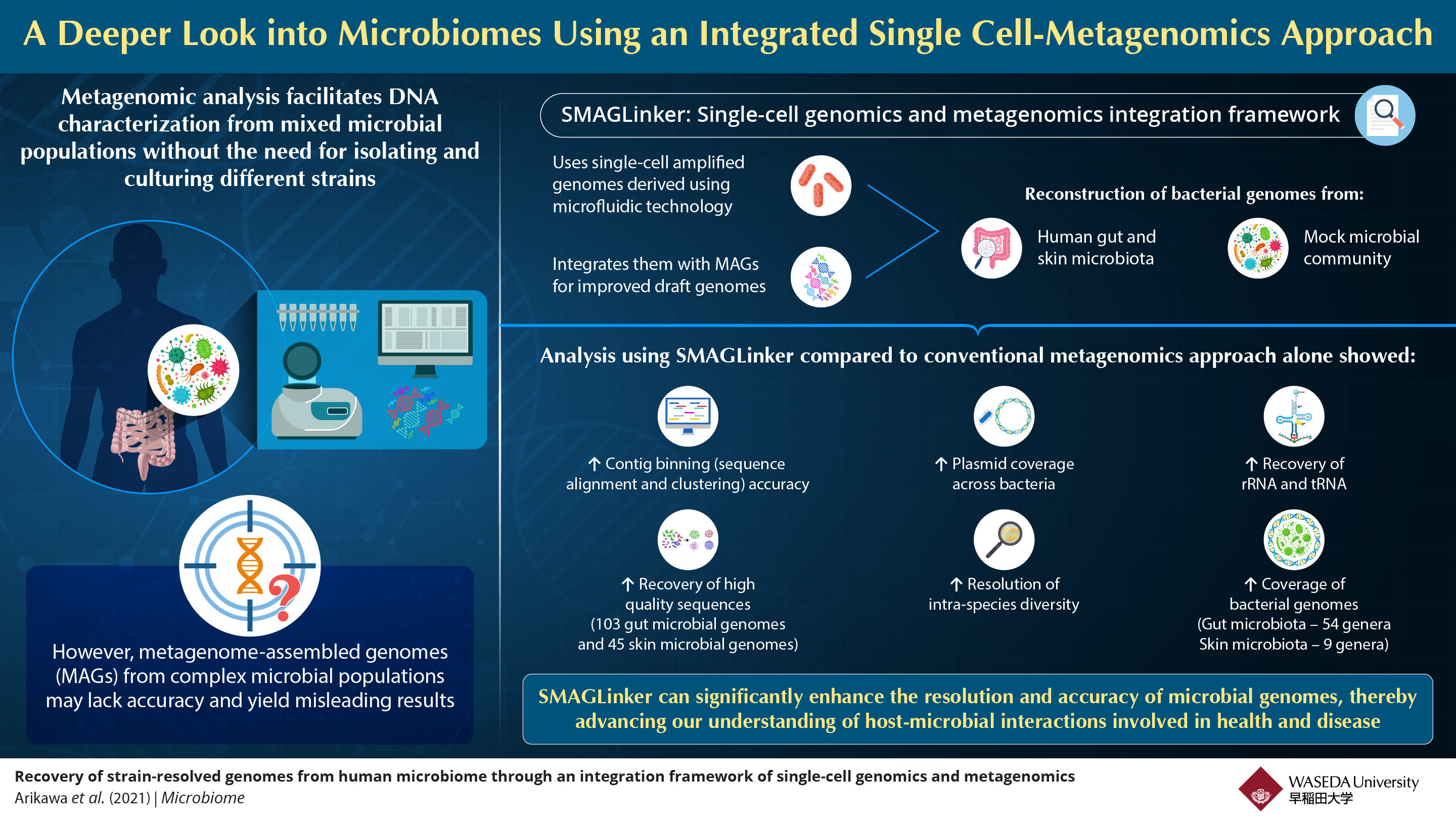New Technique Combines Single-Cell and Metagenomic Analyses to Characterize Microbes
Wed, Oct 13, 2021-
Tags
New Technique Combines Single-Cell and Metagenomic Analyses to Characterize Microbes
Researchers develop an integrated single-cell metagenomics framework that can improve the accuracy and resolution of microbial characterization
Metagenomic analysis has greatly advanced our understanding of the complex human microbiome without the need for extensive bacterial isolation and culturing. However, metagenome-assembled genomes may be imprecise and insufficiently differentiate closely related species. Now, researchers from Japan have developed a novel integrated framework that combines conventional metagenomics and single-cell genomics and can complement the lacunae in each approach, thus yielding better genome recovery and accurate resolution of complex microbial populations.
The microbial inhabitants of the human body, collectively known as the “human microbiome”, play an integral role in maintaining the health of the body. These microbes often reside in harmony, while also aiding normal physiological processes. However, any imbalance in their populations can trigger various pathological conditions. Understanding these host-microbe relationships in health and disease is therefore crucial.
Metagenomics, an advanced DNA sequencing technique, enables the direct extraction and in silico (or computer-simulated) characterization of genetic material from mixed microbial populations at once, while bypassing the cumbersome task of isolating and culturing different bacterial species from the mixture. While this technique is useful in getting a broader picture regarding the microbiome, finer details across closely related species can be missed, thereby contributing to bias and inaccuracy.
Single-cell (sc) genomics is a promising alternative approach that enables the recovery of genomes from individual cells. In the larger picture, however, this approach can result in incompleteness of the assembled genomes given the smaller DNA fragment sizes, compared to the conventional metagenomics approach.
In a pioneering collaborative study between Waseda University, Japan, and bitBiome, a startup initiative from Waseda University, a team of researchers including Associate Professor Masahito Hosokawa tested a hybrid approach combining conventional metagenomics with sc-metagenomics that can bridge the gaps in both the techniques. “Bacterial genomes reconstructed from metagenomic analyses alone are imperfect and contain errors. We have developed a novel single cell metagenomics integration framework, termed SMAGLinker, which determines the genome sequence of each cell individually. Using this method, we aim to obtain accurate bacterial genomes comprehensively, which has been a challenge in the past,” explains Hosokawa, who is also the founder of bitBiome.
They first generated single-cell amplified genomes (SAG) using microfluidic technology (an advanced DNA amplification technique), for the human gut and skin microbiota, as well as for a “mock” microbial community containing known bacteria for validation purposes. Next, they analyzed and clustered the sequences, using a method called “contig binning.” They integrated this analysis with metagenome-assembled genomes (MAG) to improve the overall coverage and binning accuracy.
On comparing the integrated approach with the conventional metagenomics approach, they found that the former showed higher accuracy and precise binning along with a notably higher genome recovery rate (including rRNA, tRNA and plasmids), compared to the conventional approach.
Using SMAGLinker, the researchers could construct a large number of high-quality genomes from the gut and skin microbiota. Moreover, genomes obtained using this integrated approach spanned a larger number of bacterial genera compared to the conventional approach, indicating better coverage of bacterial diversity.
Diving deeper, the researchers also obtained better resolution of intra-species diversity using SMAGLinker. While the conventional metagenomic approach revealed only one genome of the bacterium Staphylococcus hominis, contaminated with other Staphylococcus species genomes, the integrated approach revealed two independent strains harboring distinct plasmids from the same skin microbiota sample. They were also able to successfully validate their findings using the mock microbial sample.
Single-cell genomics and metagenomics integration framework (SMAGLinker), developed by researchers from Waseda University, Japan and bitBiome, can aid in the accurate genomic characterization of complex microbial populations.
Image credit: Professor Masahito Hosokawa, Waseda University, Japan (sourced from Figure 1 of the main manuscript)
In summary, SMAGLinker is a powerful tool that can improve the accuracy and quality of genome recovery and resolution of closely related genomes in complex microbial mixtures. The authors are excited about the potential ramifications of their findings. “Human commensal bacteria are deeply related to human health and understanding host-microbe interactions is important for designing novel medical treatments as well as for industrial and environmental applications. We are hopeful that this technology can be extended across diverse research disciplines for accurate microbial characterization,” concludes Hosokawa.
Reference
Authors: Koji Arikawa1, Keigo Ide2,3, Masato Kogawa4, Tatsuya Saeki1, Takuya Yoda1, Taruho Endoh1, Ayumi Matsuhashi1, Haruko Takeyama2,3,4,5, Masahito Hosokawa1,2,4
Title of original paper: Recovery of strain-resolved genomes from human microbiome through an integration framework of single-cell genomics and metagenomics
Journal: Microbiome
Latest Article Publication Date: October 12, 2021
DOI: https://doi.org/10.1186/s40168-021-01152-4
Affiliations:
1. bitBiome, Inc., Tokyo 162-0041, Japan.
2. Department of Life Science and Medical Bioscience, Waseda University, Japan.
3. Computational Bio Big-Data Open Innovation Laboratory, National Institute of Advanced Industrial Science and Technology, Tokyo, Japan.
4. Research Organization for Nano and Life Innovation, Waseda University, Tokyo, Japan
5. Institute for Advanced Research of Biosystem Dynamics, Waseda Research Institute, Tokyo, Japan















